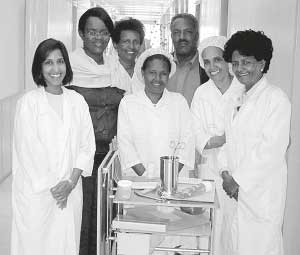 |
|
Amreen Husain (left) and Joelle Osias (second from left) were part of a group of Stanford gynecologists who joined staff at the Mekane Hiwet Hospital in Asmara, Eritrea, to treat women for injuries from lengthy labors. |
|
Stanford Gynecologists Lead Surgical Mission to Eritrea
By Rosanne Spector
Photograph by Mary Lake Polan
Imagine being in labor for five days, with a three-day trip by donkey as your only means of transport to a hospital for an emergency delivery. In rural Africa, such an experience is common and often ends in despair: the baby emerges dead and the woman suffers severe birthing trauma. A recent Stanford-led gynecological surgery mission to Eritrea repaired the physical damage ensuing from nearly 40 prolonged labors such as these. The trip stemmed from a 2001 visit by Mary Lake Polan, MD, PhD, chair of the Department of Obstetrics and Gynecology, who documented women's health conditions there.
During a labor of several days, the pressure of the fetus' head against the pelvis can cut off the area's blood supply, killing the tissue. This condition, called a fistula, leaves a hole between the bladder and the vagina or, more rarely, between the rectum and the vagina. As a result, women with fistulas leak urine from their vaginas and in some cases stool. The women smell bad, soil their clothes and surroundings and develop painful rashes and infections.
In the United States, fistulas are rare. But in the developing world, the rate of fistula is estimated to be 350 per 100,000 deliveries, Polan says. Several factors likely lead to these higher rates: Malnutrition and stunted growth increase the likelihood of obstructed labor; cultural practices lead to early marriages and early pregnancies; and health care is extremely limited.
Polan organized the surgical mission to Mekane Hiwet Hospital in Eritrea's capital city Asmara. Gynecologists volunteered for the trip and pharmaceutical and medical device companies including C.R. Bard Inc., CooperSurgical Inc., Cook Urological, Boston Scientific Microvasive Urologic, Ethicon Corp. and Nellcor donated more than $40,000 of equipment and medicines.
The surgical team, consisting of Amreen Husain, MD, ob/gyn assistant professor; staff gynecologists Carol Glowacki, MD, and Joelle Osias, MD; and Johns Hopkins University fistula surgeon Clifford Wheeless, MD, arrived in Asmara Sept. 20. Polan coordinated the team's visit.
When they arrived at the Asmara hospital, 20 patients were already waiting and more soon came. By the time the team members returned home on Oct. 9, they had repaired 37 fistulas.
The experience was exhilarating despite the gravity of the fistula problem. "It was amazing to me how courageous the women were," says Husain. "Some came alone, traveling for three or four days, to be operated on by these doctors who were foreign. And the doctors there were phenomenal too. They were willing to do types of cases they had never seen or done before."
Only a few fistula hospitals exist in the world, most in Africa, but all are nearly impossible for Eritrean women to reach. The Stanford team hopes to work with Eritrean officials to establish a fistula center at the Mekane Hiwet Hospital.
Comments? Contact Stanford Medicine at

